Uganda’s gold boom leaves small-scale miners behind
With exports experiencing a sharp rise, Uganda is formalising its gold sector. But who is benefitting?
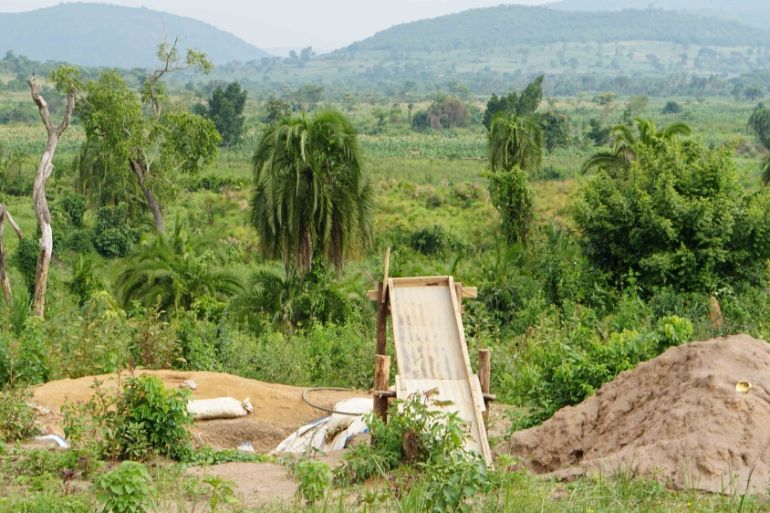
“There’s gold over there but they don’t let us touch it,” says Jalia Namatovu, pointing to hills covered in a thick layer of vibrant green forest in Mubende, Central Uganda.
Here lie some of the country’s rich gold reserves, which are increasingly being explored by Ugandan and foreign companies alike.
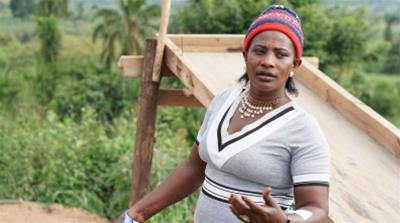
“It’s owned by a muzungu [white person]. Villagers say the company put crocodiles in the river so we can’t get in. They get their water from somewhere else now,” she laughs darkly.
Keep reading
list of 4 itemsChina’s economy beats expectations, growing 5.3 percent in first quarter
Inside the pressures facing Quebec’s billion-dollar maple syrup industry
Manipur’s BJP CM inflamed conflict: Assam Rifles report on India violence
Namatovu is a small-scale or artisanal gold miner – although the mineral has not actually passed through the 39-year-old’s hands in nearly two years. “I’m hopeful we’ll find gold soon because we have a licence now,” says Namatovu, chairperson of Mubende Women Gold Miners Association.
Artisanal gold miners in Mubende – and across Uganda – have long been operating without licences. But in recent years, the government has begun formalising the sector, including stricter licencing requirements and biometric registration for miners. In May 2018, a new Mining and Mineral Policy was approved by the cabinet, and an accompanying law is in the draft stage – with public consultations expected this July.
The new system recognises artisanal miners as players and intends to make working conditions safer and ensure the sector contributes to Uganda’s economic development, although most of these benefits are yet to be seen on the ground.
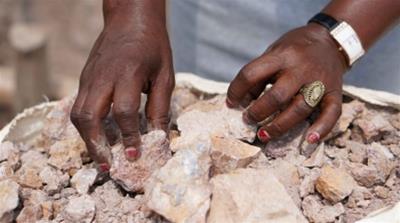
Uganda is not famed for its gold reserves. But since 2016, gold exports have rocketed in the East African country. According to official data, gold worth $514m was shipped out of Uganda last year – over 50 times what the country was exporting a decade ago. Yet Uganda is not producing more gold itself, raising questions about its source.
The answers may lie with the African Gold Refinery (AGR), a Belgian-owned firm whose deal with the Ugandan government preceded the sharp export increase. The company was recently alleged to have received gold worth $300m from Venezuela, surpassing US sanctions, and has also been accused of smuggling “conflict gold” from countries such as the Democratic Republic of the Congo (DRC). Uganda’s main anti-corruption body is investigating the company for money laundering and tax evasion, according to Belgian newspaper De Standaard. AGR did not respond to Al Jazeera’s multiple requests for comment over two weeks.
Whose boom is it anyway?
The benefits of Uganda’s increasingly profitable gold trade are not yet seen by small-scale miners like Namatovu, and none of the miners Al Jazeera interviewed were aware the mineral has become their country’s largest export. On the contrary, Namatovu’s livelihood has suffered: she was one of an estimated 60,000 miners evicted from Mubende mines in August 2017, and has not successfully mined gold since.
The evictions were ordered by President Yoweri Museveni on the grounds that unregistered miners were damaging the environment and illegally “invading” gold deposits licenced to AUC Mining – a locally registered company with Ugandan and British owners, including long-time Presidential Adviser Gertrude Njuba.
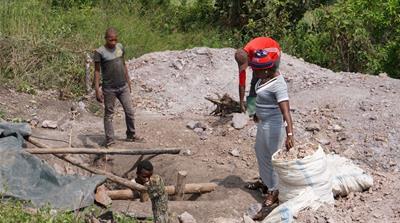
“One morning we were preparing breakfast and getting ready to start work at the mines, when soldiers came carrying guns,” remembers Namatovu. Officers gave the miners six hours to leave, and people who resisted were forcibly removed, she says. Namatovu had worked at the mines for three years, supporting her two children and elderly mother.
“We quickly took what we could but had to leave a lot of things behind,” she says. Namatovu and her friends lived in temporary structures close to the mines, unable to afford daily transport from the nearest town.
“The evictions are a result of demand for gold which has led bigger companies to start coming into the country and seek[ing] to commence operations,” explains Paul Bagabo, the Uganda consultant for the Natural Resource Governance Institute. Rather than benefiting from the heightened demand, small-scalers are losing work as pits previously under their management are allocated to companies.
While gold prices have just hit a five-year high in the United States, Bagabo says the influx of imported gold does not bode well for prices locally: the demand for local gold diminishes, and consequently, so do the prices, he said.
Winnie Ngabirwe, executive director of local NGO Global Rights Alert, agrees that imported gold supplying the market puts the livelihoods of artisanal miners at risk. Middlemen “will come to buy your gold at a price that they can give you, because you’re literally begging them,” she says. More broadly, the influx denies all citizens “the right revenues, because these minerals are likely entering Uganda without being taxed,” she adds.
Bringing women together
“After the eviction, some men ran and left women, pregnant or with children,” remembers Namatovu, explaining that without work most men who were not from the local area fled. Many women were also left homeless. “We were promised compensation from the government but it did not come,” she says.
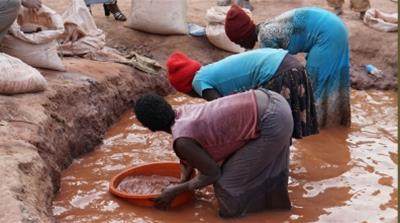
Noticing that women evicted from the mines had similar struggles, Namatovu wanted to “bring women together”. They started small businesses digging gardens and rearing goats, sharing profits with each other and ensuring there was sufficient care for those who were pregnant.
“One of us would stay at home and take care of the children while the others went to work,” she explains. Namatovu also turned chicken coops at her mother’s house into shelters for women who had no accommodation.
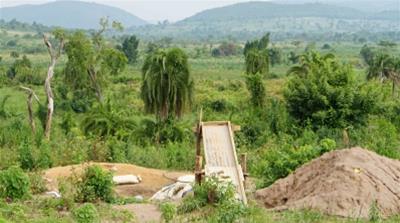
“We hoped that we would go back to the mines, but in the meantime, we wanted to take care of each other,” says Namatovu. From this, Mubende Women Gold Miners Association was born – a step towards ensuring female representation in the newly formalised sector. This is particularly necessary as often in cases of compensation and resettlement of mining sites “funds are received by men … and women are not taken into consideration,” says Bagabo, adding that when demand for labour is down, women are the first to be let go.
“They don’t think women can handle going deep into the mines,” sighs Namatovu.
The first two-year licences were given to evicted miners in Mubende at the start of 2019, for use in the 30 percent of mining areas designated for artisanal miners. The other 70 percent of the land is controlled by AUC Mining and its subsidiary Gemstone International.
The 30 percent allocated for small-scale miners is shared between Mubende United Miners Assembly (MUMA) – of which Namatovu’s association is a part – and the Federation of Artisanal Miners of Uganda. MUMA has 30 percent of that area, while the Federation has 70 percent. But local media has reported that Stella Njuba, late daughter of AUC owner and Presidential Adviser Gertrude Njuba, is registered as a director of the “hitherto unknown” Federation.
Fool’s gold?
Namatovu’s group members have been exploring their allocated site – in the middle of a field full of towering maize crops – for two months now. But she says they have yet to strike gold – partly because they are unable to afford appropriate equipment.
Julio Tumwebaze, a young worker in the mine, says that small-scalers applied for licences on land based on a government map of gold areas, but “we’re just guessing with our eyes where to dig”. Miners can pay for a government geological expert to survey the area, but at 2.5 million Ugandan shillings (nearly $680), it is unaffordable for most.
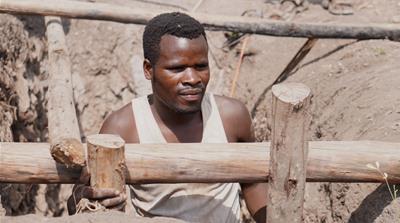
Small-scalers are low-income earners as it is – Namatovu says before the eviction, she was earning about $20 a week – and on top of the additional set-up costs a geologist assessment is not yet feasible for her.
MUMA told Al Jazeera that the president made a verbal promise at a meeting with them at the State House to provide mining equipment to the artisanal miners, but they have not received any support yet. The Mining and Mineral Policy seen by Al Jazeera also outlines that the government will ensure “capacity building, facilitate access to credit enhance technology transfer and use of appropriate equipment” for small-scalers.
“Now the only hope we have is for the gold to show,” says Namatovu, although she clearly feels insecure about another eviction.
At a nearby gold processing centre, Janat Nanzala, 30, is washing gold ore. “The mercury is not safe. We wish we had a machine to do the job instead,” she says, adding that the thought of a company taking over more mines frightens her. Still, she is positive about having a licence “so we can follow up on the people who come to buy gold”.
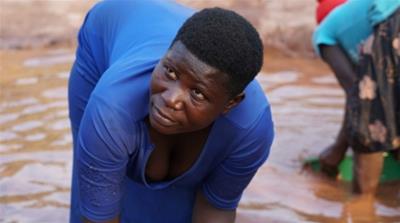
Bagabo says that small-scale miners were “used as explorers” -allocated areas away from the mines they were working in before, where the existence of gold deposits was confirmed. “They did the prospecting and now they are being denied a chance to mine in those areas,” he says, adding that there is no certainty of gold in the new areas that miners have been given.
Even if gold is found, it remains unclear whether the artisanal miners will be able to benefit long term. “Some billionaires from Kampala, and maybe from the government, can come and take over your licence,” says Namatovu, looking out into the field. “But we don’t want this to happen because we want to work, we just need the means to do it.”